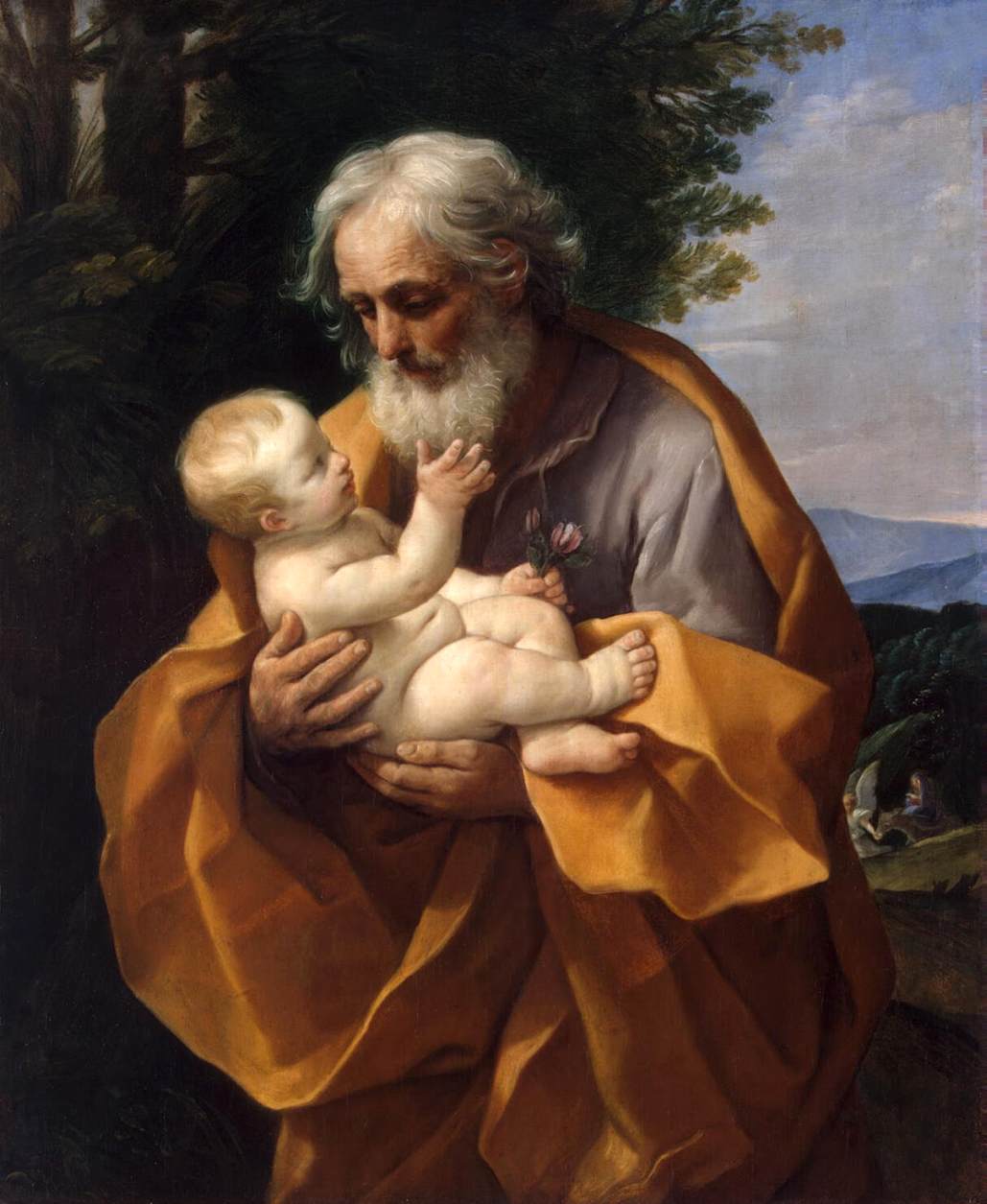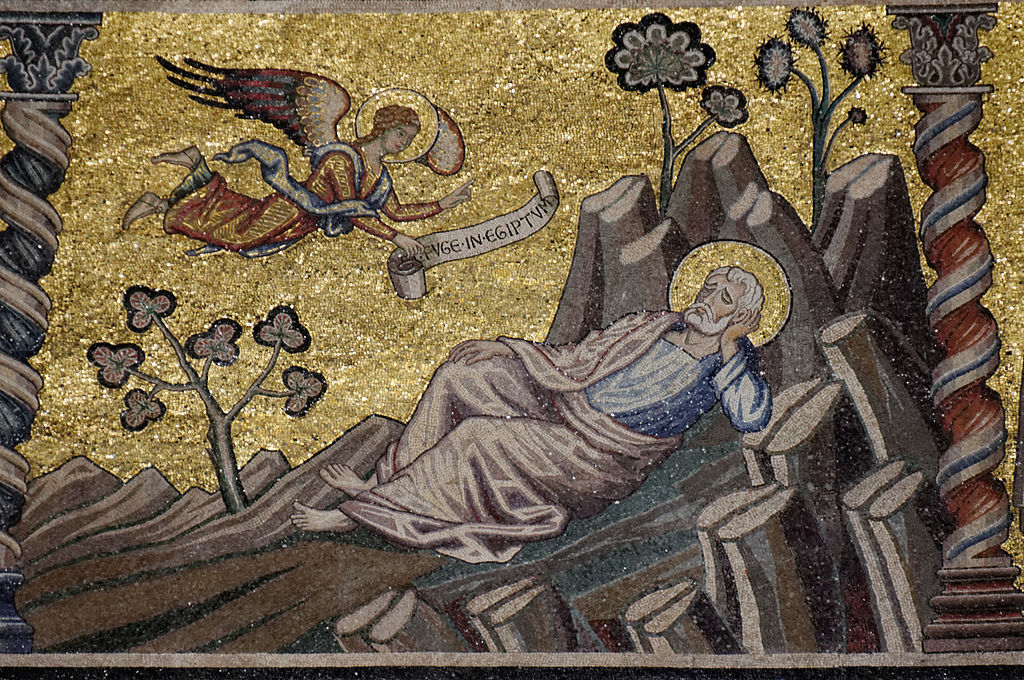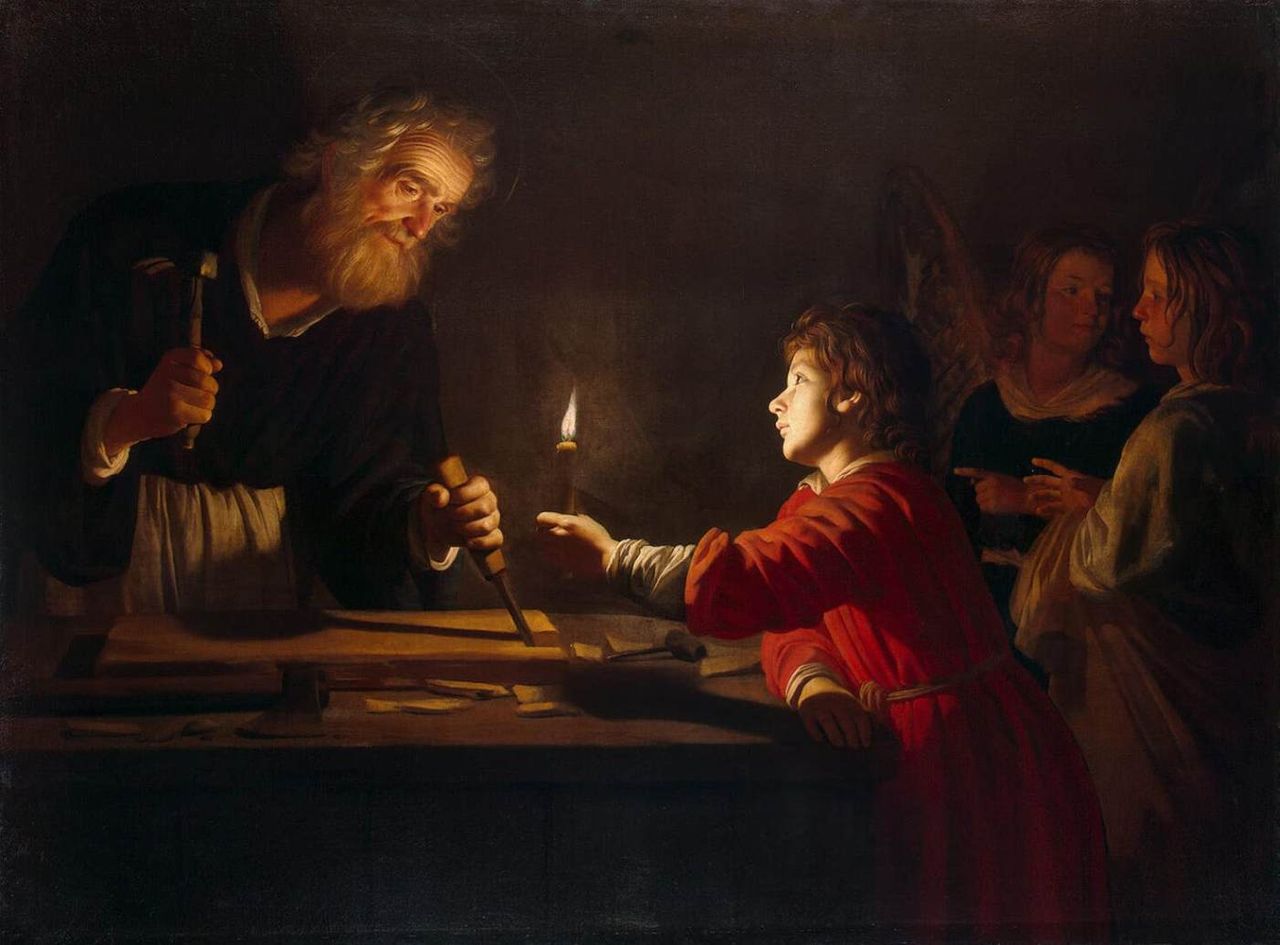Solemnity of Saint Joseph, husband of the Blessed Virgin Mary: 2 Samuel 7:4-5a, 12-14a, 16, Romans 4:13, 16-18, 22, Matthew 1:16, 18-21, 24a.
Today we honor the faithful foster-father of Jesus. In his homily this morning, Bishop Robert Barron calls St. Joseph “the most powerful heavenly friend we have” after his spouse, Mary. He also mentions his statue of St. Joseph sleeping, under whose head Pope Francis mentioned that you place your petition so that he can dream about it. What a comforting and personal way to approach St. Joseph. Today’s gospel illustrates how St. Joseph’s dreams were inhabited by God and provide him with a way to accept difficult realities in faith. He is a role model for us in many ways.
In the reading from the Second Book of Samuel, the Lord speaks to the prophet Nathan, who is to pass on His message to King David. David wanted to build a house for the Lord, but God said, no, I’ll build you a house instead. This “house” is to be his lineage, and God promises, “your throne shall stand firm forever.” We know that Joseph, the husband of Mary, comes from the line of David, and with Jesus as their son, God’s promise is upheld.
There is one other line from this reading that is interesting to ponder. Speaking of David’s heir who will have “sprung from your loins,” God says, “I will be a father to him, and he shall be a son to me.” On one hand, we know that the literal Son of God (Jesus) has God as his Father. But the heir who has biologically sprung from David’s loins is actually Joseph. Here, the eternal Word of God is saying that he will be a father to Joseph, in an interesting reversal of the story where we know Joseph is the foster-father to Jesus. And this turns out to be true, as the Word of God as given to Joseph by angels in his dreams guide the Holy Family and keep them safe.

St. Paul’s letter to the Romans in our second reading notes that faith is the critical aspect of the fathers in God’s chosen people. God’s covenant with Abraham, Paul says, is established “through the righteousness that comes from faith,” not from the law as if it did not need a personal response from Abraham. Paul also gives us a brilliant insight into why God maintains that we should have free will: “For this reason, it depends on faith, so that it may be a gift.” God wants his protection, grace, and favor to be a gift to us, not an imposition of power. When Abraham “believed, hoping against hope, that he would become the father of many nations,” he reached out to God with his faith and asked for the gift, and God gave it to him. In other words, God plants a seed of hope in us, to which he wants us to respond. Our desire for His graces enables Him to respond in a way where we receive Him as a gift. This is the model of fatherhood: a guiding hand that does not impose but allows the child to grow him or herself, with neverending forgiveness and gifts to support their positive growth.
In the gospel, in the midst of this already daunting lineage of Abraham (father of fathers), King David, and God the Father Himself, we meet Joseph. No pressure, Joseph, you’ve just been asked to be a father to God in the flesh. First test: accept a fiancée who is pregnant, not by your doing.
The first thing we learn about him is that Joseph is a good man. He doesn’t want to shame Mary, he knows that she is actually in danger given the law of Moses and punishments for sex outside of wedlock, so he plans to divorce her quietly. With these difficult thoughts on his mind, Joseph sleeps and an angel of the Lord appears to him and explains everything. Mary was made pregnant by the Holy Spirit and the child should be called Jesus because he will “save his people from their sins.” This dream is not just a “be good to the pregnant girl” dream. It’s a revelation of Jesus’s identity. Joseph is told three important things: 1. the Holy Spirit the source of his conception, which might be a little ambiguous but speaks to divine intervention. 2. The child will save “his people.” The only beings to whom people belong are kings and God; either way, this speaks to the majesty of the child. 3. The child will save his people “from their sins” — this implies a great holy man, on the order of a prophet.
St. Matthew reports Joseph’s reaction to this incredible revelation in a bit of an understated manner: “When Joseph awoke, he did as the angel of the Lord had commanded him and took his wife into his home.” Just as we will see in a week’s time when we celebrate the Annunciation, God’s plan of entry into humanity hinges on some critical moments when a human must say “yes” to Him. This is one of those moments. Joseph chooses to follow the angel’s commands he hears in a dream. He doesn’t go searching for someone to help him interpret the dream, he doesn’t ignore the dream as “just a dream,” and he doesn’t banter with Mary about it before making up his mind. He chooses faith because he fears the Lord (not in the sense of being scared, but being awed and reverent to his core).

Let’s take St. Paul’s lead and compare Joseph’s response to what Abram does when the Lord commands him to leave his life, family, and country at the age of 75 to start anew. The Book of Genesis reports: “So Abram went, as the Lord had told him” (Gn 12:4). It’s a similar, brief account of their obedience. What type of unquestioning obedience is this that causes an upstanding, mature man to leave behind everything that has ordered his life to that point? It’s an obedience fed by faith, a faith cultivated by living in God’s law, in right relationship with Him. Our fathers in the faith (Abraham, Joseph) demonstrate how obedience, faith, and law are ordered towards each other and flow into one another. The law prescribes ways to live out and remember our fidelity to the Lord. The law draws us into relationship with God (through prayer, ritual, and other devotions), where we learn to have faith in Him. Our faith, in turn, allows us to be obedient when all other earthly concerns would have us ignore Him.
Many outsiders to the faith see our religion as rules that we unthinkingly obey (the crowd of people who say “I’m spiritual but not religious” or “I believe in God but not organized religion”). But these people are missing the whole mystical point. The faith to which we are called is this beautiful, intangible, spiritual gift that is itself our relationship with God. His law is meant to draw us closer to Him in daily practice, building our faith. That faith then allows us to happily obey His commands (including the very law that brought us to Him in the first place). It’s a lovely, self-feeding cycle of growth in the Lord and the lynchpin ingredient is faith, which gives it all meaning. Sure, rules and obedience would be a masochistic, meaningless endeavor if faith was not present. But when faith is present, we start to live up to our true potential as human beings.
St. Joseph the dreamer didn’t obey just one dream, but at least three that we know of from the gospels. His second dream was to flee to Egypt after Jesus’s birth to escape Herod’s horrendous decree to kill the firstborn of everyone in Israel. His third was the angel encouraging them to return to Nazareth. What an incomparable father, listening to and obeying the Word of God, just like his wife and so much more so his son, who reconciled his human nature completely with the Word of God in himself.
This is our Holy Family, our guide and model for humanity. God saved us from eternal death and sin thanks to their faith and obedience.

My FAVORITE LINE TODAY is: fear of the Lord is being awed and reverent to the core. That is a wonderful interpretation of a gift of the Holy Spirit i.e. “fear of the Lord”. I shall remember that!